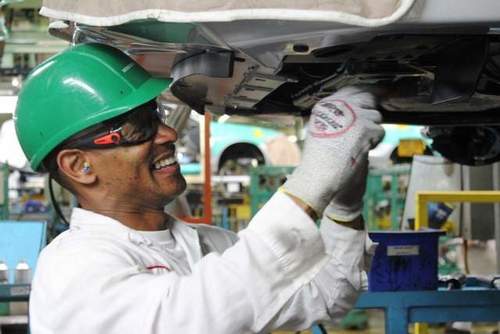Jul 31 2012
Kaizen and small things – A recent example
This picture shows a recent example of genuine Kaizen in a US factory. The workpiece in the vise is 28 ft long, and requires greasing in multiple locations. The operator on the left was tired of running back and forth to a fixed location to pick up the grease. The cart now contains everything he needs to apply grease anywhere on the work piece, and he wheels it back and forth as needed. To the right is the production supervisor for the area, who supports this and other similar projects.
How was it actually done? The production team from this area was given a budget of $500/operator to spend as they saw fit on supplies and devices for improvement projects at a Home Depot store. Their actual spend worked out to $113/operator, including the cart and bins you see on the picture and a magnetic sweeper.
It is a perfect illustration of the Kaizen concept. It is too small an improvement to warrant the attention of engineers or managers, yet it makes the work easier for the operator and makes him more productive. The only way to make sure such improvements are made is to enable and encourage the people who do the work so that they do it themselves. It is a valuable part of Lean, but it is not all of it. Higher-level issues must also be addressed, include make-versus-buy decisions and production line layout.






Aug 1 2012
What about operators who do not want to be cross-trained?
Question from Bret Matthews on LinkedIn:
You have two seemingly contradictory objectives:
This is how I would recommend managing the transition, and it involves Human Resources:
The idea is to allow the old categories to coexist with the new for the transition period, and eventually disappear. Most operators will come around when they see that the company is serious about cross-training and shows it in visible, concrete and tangible ways. For those who don’t, you need to find the best way to use the skills they do have. To the extent it’s not disruptive, they can stay in place, but they can also migrate to other functions in Maintenance, Quality, or even Training.
You should also keep in mind that cross-training is a never ending quest, because people who are fully trained on all the jobs in a shop are first in line to be promoted out of the shop and new people come in.
Share this:
Like this:
By Michel Baudin • Policies 2 • Tags: Lean manufacturing, Management, Multi-skilled operators